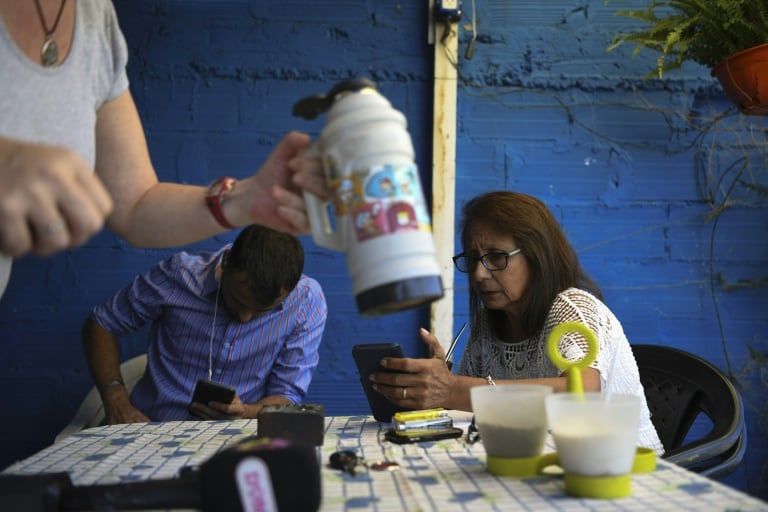Argentine child sex abuse scandal widens
A child abuse scandal involving several of Argentina's most famous football clubs continued to unfold with interviews and searches while rippling outwards to include the country's gymnastics federation.

The lid was first lifted in March after a 17-year-old player with top Argentinian side Independiente told a club psychologist that he and another young player had been encouraged to sell themselves for sex. Club directors reported the allegations to the police.
On Monday a doctor and a psychologist at another Buenos Aires club, River Plate, told authorities that young footballers and volleyballers at the club had suffered sexual abuse.
Authorities are also investigating a potential case at a third football club, Temperley.
On Tuesday, the Argentine Olympic Committee (COA) said a 40-year-old former gymnast had complained of abuse as a minor.
Asked on Argentine TV how many gymnastics cases there might be, COA president Gerardo Werthein said “it is difficult to know” but added that “there are several.”
Buenos Aires-based River Plate and Independiente are two of the most famous clubs in the country.
River have won a record 36 league titles while Independiente have won the Copa Libertadores — South America’s equivalent of the UEFA Champions League — a record seven times.
Both are multi-sport clubs and operate hostels for young players recruited from across Argentina and abroad.
Recent graduates of the River youth system include Javier Mascherano (Barcelona), Gonzalo Higuain (Juventus), Erik Lamela (Tottenham) and Radamel Falcao (Monaco), who was bought from a Colombian club on his 15th birthday. Sergio Aguero (Manchester City) is a product of the Independiente youth system.
— Coaxed into prostitution —
Teenagers boarding with Independiente were reportedly coaxed into selling themselves in exchange for money, promotion to other teams within the club, football boots or even underwear.
The teenager at the centre of the allegations said he and a 19-year-old player had been encouraged to sell themselves in a trendy Buenos Aires neighbourhood, where sexual encounters were organised with adult men, according to the local press.
“The structure of this underage prostitution network didn’t only operate at Independiente. There are other clubs,” public prosecutor Maria Soledad Garibaldi said.
So far, six people have been arrested as result of the Independiente case, including referee Martin Bustos, a public relations official and an organiser of youth tournaments.
At River Plate, the complaint filed with police concerns the alleged sexual abuse of players in youth teams between 2004 and 2011, according to judicial sources cited by local media.
“A surgeon knew there had been abuse of children who lived at the boarding facility at River,” Andres Bonicalzi, a lawyer for a rape victims charity, said at a press conference on Monday.
Among the cases were two, involving young football players and one concerning a girl on a volleyball team.
“We are investigating the testimony of provincial families whose children are victims of a paedophile network,” Bonicalzi added.
Police searched River’s facilities on Tuesday. The doctor and psychologist are due to give their testimony to prosecutors on Wednesday.
“Children came from their provinces with a dream,” said Maria Elena Leuzzi, the founder of Association of Victims of Violation, the NGO that defends minors who suffer sexual abuse and which arranged the official complaint to police by the River Plate medical staff.
“They stole their childhoods and their bodies,” she said.
Oscar Mangione, a former psychologist at another famous Buenos Aires club, Boca Juniors, said one problem is that only a tiny handful of the youngsters the clubs take from their homes make it as footballers.
— Context of vulnerability —
“Football is seen as a way upwards, but that’s not true because from every hundred boys who enter the system only two or three will play in the first division,” Mangione said.
“These abuses occur in a context of vulnerability: many of these youngsters come from distant provinces and are separated from their families.
“These reports will show that parents need to take more precautions.”

Maria Elena Leuzzi is the president of the Association of Victims of Violation which organised the complaint against the River Plate club
But, he added, “this is not something limited to the clubs, these networks take advantage of the vulnerability of the boys, it is likely that they will also recruit young people in poor neighbourhoods.
Another Argentine sports psychologist, Miguel Garcia Lombardi, said the way the youth system functions encourages players to see themselves as merchandise.
“A footballer is playing to become a millionaire, we are in the process of marketing football, it starts with the player’s body. We buy the player, we invest in that body to make money,” Lombardi said.
“Sex is just another element.”
For more news your way
Download our app and read this and other great stories on the move. Available for Android and iOS.









